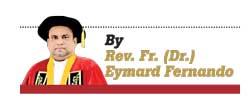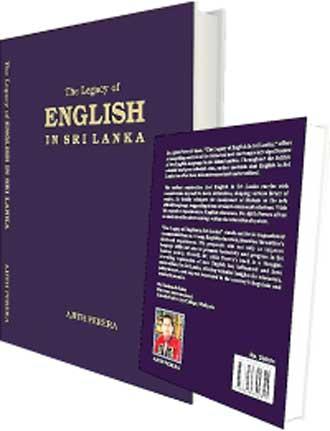04 Oct 2024 - {{hitsCtrl.values.hits}}
 Across South Asia, one of the most populous and densely populated geographical regions in the world, English is widely seen as the language of social mobility, academic opportunity, employability, international business and effective dialogue. As a result, many rightly consider English language skills to be an essential component of reaching the desired goals and targets on an individual, as well as, national level.
Across South Asia, one of the most populous and densely populated geographical regions in the world, English is widely seen as the language of social mobility, academic opportunity, employability, international business and effective dialogue. As a result, many rightly consider English language skills to be an essential component of reaching the desired goals and targets on an individual, as well as, national level.
 Faced with such a scenario, a country like Sri Lanka will be no better than a fish out of water sans English language literacy. But unfortunately, both teaching and learning this treasured language in our education system remains highly questionable after the Official Language Act (No. 33 of 1956), commonly referred to as the Sinhala Only Act, passed in the Parliament of then Ceylon (Sri Lanka) in 1956. The Act replaced English with Sinhala as the sole official language of the country, with the exclusion of Tamil. Many see this as yet another narrow-minded political move in the history of Sri Lanka illumined and inspired purely by a set of vested interests on the part of those behind it.
Faced with such a scenario, a country like Sri Lanka will be no better than a fish out of water sans English language literacy. But unfortunately, both teaching and learning this treasured language in our education system remains highly questionable after the Official Language Act (No. 33 of 1956), commonly referred to as the Sinhala Only Act, passed in the Parliament of then Ceylon (Sri Lanka) in 1956. The Act replaced English with Sinhala as the sole official language of the country, with the exclusion of Tamil. Many see this as yet another narrow-minded political move in the history of Sri Lanka illumined and inspired purely by a set of vested interests on the part of those behind it.
To call a spade a spade
 Above all, the attempt made by Dr. Ajith Perera in his book, ‘The Legacy of English in Sri Lanka’to call a spade a spade is highly praiseworthy! He highlights certain important elements as to why teaching and learning English in Sri Lanka, especially in school curriculum, with some exception of English Medium Schools, is not up to the mark. English is a language, and not a subject. Thus, as a language, it has to be more‘caught’ than ‘taught’, based on all the different components of learning a language namely, Listening, Understanding, Thinking, Speaking, Reading and Writing. Proper and wholesome language learning involves paying equal attention to all these different areas of acquiring language skill. But, as a matter of fact, today many English language teachers use their mother tongue to teach English. According to Dr. Perera, it is feeding British English with a vernacular spoon! Teachers’ interest in making use of creative ways and modern techniques to give vim, vigour and vitality to this “twice blest” a noble task as teaching “blesseth him that gives and him that takes”, gathering inspiration, of course in a different context, from Portia’s speech in William Shakespeare’s ‘The Merchant of Venice’, undoubtedly motivates the students to pursue this treasure hunt and persevere in the race! Thus, Dr. Perera has rightly hit the nail on the head in emphasising so vividly the importance of recruiting English language and English medium teachers with proper scrutiny. The Latin maxim, “Nemo dat quod non habet” – No one can give what they do not have – contains volumes of truth in this regard.
Above all, the attempt made by Dr. Ajith Perera in his book, ‘The Legacy of English in Sri Lanka’to call a spade a spade is highly praiseworthy! He highlights certain important elements as to why teaching and learning English in Sri Lanka, especially in school curriculum, with some exception of English Medium Schools, is not up to the mark. English is a language, and not a subject. Thus, as a language, it has to be more‘caught’ than ‘taught’, based on all the different components of learning a language namely, Listening, Understanding, Thinking, Speaking, Reading and Writing. Proper and wholesome language learning involves paying equal attention to all these different areas of acquiring language skill. But, as a matter of fact, today many English language teachers use their mother tongue to teach English. According to Dr. Perera, it is feeding British English with a vernacular spoon! Teachers’ interest in making use of creative ways and modern techniques to give vim, vigour and vitality to this “twice blest” a noble task as teaching “blesseth him that gives and him that takes”, gathering inspiration, of course in a different context, from Portia’s speech in William Shakespeare’s ‘The Merchant of Venice’, undoubtedly motivates the students to pursue this treasure hunt and persevere in the race! Thus, Dr. Perera has rightly hit the nail on the head in emphasising so vividly the importance of recruiting English language and English medium teachers with proper scrutiny. The Latin maxim, “Nemo dat quod non habet” – No one can give what they do not have – contains volumes of truth in this regard.
A blessing to Sri Lanka
Thus, in order to make the language of English a blessing to Sri Lanka and Sri Lankans, English teachers and all those who are involved in the field of education have a vital role to play. If this herculean task is desirably fulfilled with conviction, English promises better openings and opportunities for learners.
This highly commendable book written by Dr. Perera is no small contribution to the relevant field of English education in Sri Lanka and can be recommended for English teachers, other subject teachers who teach in English medium, school administrators, parents and students of upper grades to widen their horizons on teaching and learning English in this Blessed Land of Ours!
Let us make good use of the vast range of knowledge and experience of Dr. Ajith Perera who is a much sought-after figure in the field of teaching English in various capacities at different places for three decades presented so well in each and every page of this book which deserves our serious attention and careful study!
(The writer is an university lecturer in Linguistics and Psychology)
25 Dec 2024 9 hours ago
25 Dec 2024 25 Dec 2024
25 Dec 2024 25 Dec 2024